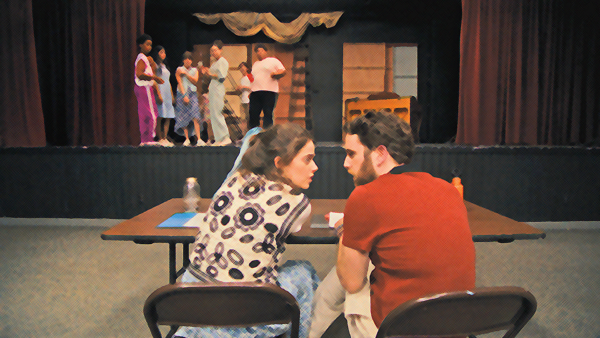
“Theater Camp,” the directorial debut by “Booksmart” actress Molly Gordon and Nick Lieberman, came to the big screen on Friday, July 14, delivering sarcasm, awkward humor — and of course, camp —to audiences everywhere.
“Theater Camp” focuses on acting teachers who run a children’s theater camp after its original owner, Joan, played by Amy Sedaris, enters a coma during a middle school production of “Bye Bye Birdie.” Based solely off the unusual plotline, it was evident that “Theater Camp” was going to be unapologetically itself throughout. The film centers on two characters, Rebecca-Diane and Amos, played by Gordon and Ben Platt of “Dear Evan Hansen,” as they struggle to save the camp from foreclosure.
Due to its small budget, the mockumentary was not expected to become as popular as it has. However, after debuting at Sundance last February, audiences immediately fell in love with “Theater Camp’s” story. Will Ferrell’s Gloria Sanchez Productions subsequently picked up the film overnight. Many ask how a movie about theater nerds became a national success, but, “Theater Camp” brings the quirky charm and unfiltered humor that contemporary comedy lacks, something that Hollywood desperately needed to channel.
Mockumentary-style comedies were popularized in the mid-90s, but they started to disappear from sight over the past decade. Mockumentaries share common tropes such as the use of talking heads, as seen in “The Office,” or forms like cinéma vérité — pieces that follow people as they go through various events, like “Best in Show.” The most defining characteristic they all share, though, is that mockumentaries must be at least partially improvised, adding to authenticity that mirrors that of a real documentary; this is done fantastically in “Theater Camp.”
Although the film was not heavily marketed, I became extremely excited for its release, having always had a voracious appetite for all things comedy. My parents introduced me early to everything from old SNL skits to — of course — mockumentaries, my favorite being “Waiting for Guffman.” Just like “Waiting for Guffman,” “Theater Camp” focuses on a theater group working towards their final performance. But what “Theater Camp” was able to expand on was its use of camp through its more vulnerable look at theater culture that “Waiting for Guffman” could not so easily do in its 1996 release.
Camp as a concept is somewhat hard to pin down, but it can most closely be described as a quality of eccentricity and anti-seriousness, which has always been the foundations of mockumentaries. Unlike past mockumentaries, “Theater Camp” focuses on the queer experience behind theater and how the two sectors are interconnected. This is evident throughout, but is particularly exemplified in a quote from Sedaris’s character, Joan. At the beginning of the film, she says, “Some of the kids really need [camp] … I wanted to make a place where anyone is free to be themselves.” This idea is central to theater: as a form of self-expression where anything goes, the stage has often been seen as a refuge for queer kids. While the film is hilarious at its forefront, beneath its one-liners and anti-seriousness lies a deeper focus on queer culture, and its beautiful execution is what made the film stand out to me from others in its genre.
“Theater Camp” is a feat of creativity among modern comedies. The improvisation, acting abilities and humor alone would be enough to make it a thoroughly enjoyable watch, but what makes “Theater Camp” so special is how it takes the regular concepts of mockumentaries and theater and elevates them to be capable of so much more, truly putting the camp in “Theater Camp.”


